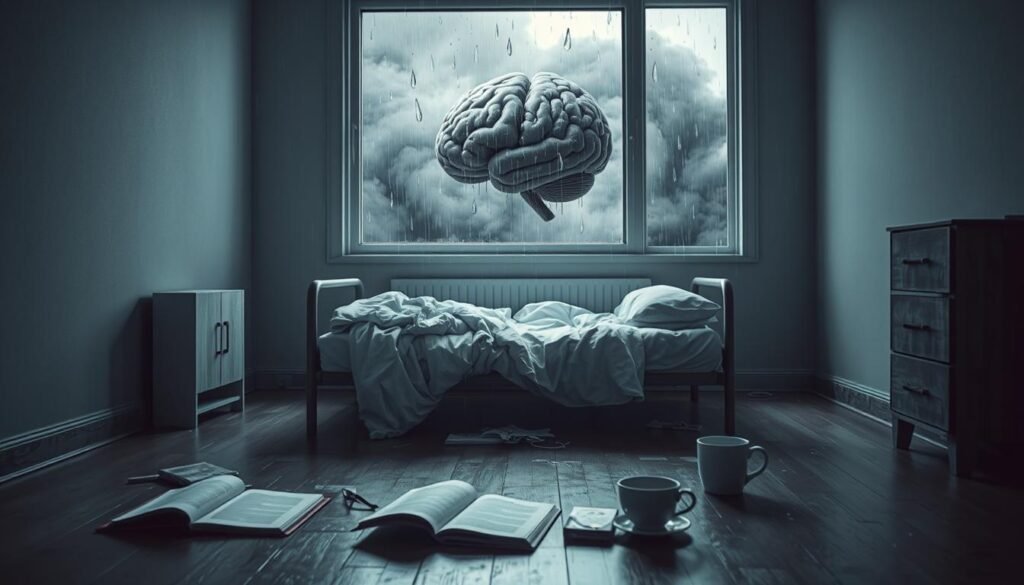People with depression are twice as likely to get chronic migraines. This affects 12% to 16% of folks in Western countries. This stat shows the deep link between chronic migraines and depression. It’s key to understand this connection.
Those with chronic migraines deal with tough symptoms. These can greatly impact their mental health, making anxiety and despair worse. Knowing how these conditions affect each other is vital. It helps in managing pain and boosting life quality for those dealing with these issues.
Key Takeaways
- Chronic migraines can severely affect mental health, with a bidirectional relationship between migraines and depression.
- Research indicates that around 40% of people with migraines also experience symptoms of depression.
- Individuals with chronic migraines may feel compelled to conceal emotions related to their pain, contributing to further mental distress.
- Understanding migraine triggers can help in managing both chronic migraines and depression more effectively.
- Genetic and lifestyle factors play significant roles in the comorbidity of chronic migraines and depression.
The Connection Between Chronic Migraines and Depression
The link between chronic migraines and depression is quite intricate. It significantly affects many people. Those with chronic migraines might be much more likely to experience mood disorders. This could stem from both genetics and the stress of living with constant pain, which can bring about feelings of depression.
It’s been found that people with migraines can be two to ten times more susceptible to anxiety or mood disorders. For those dealing with chronic migraines, the risk of getting depressed is three to six times higher. Also, the more frequent the migraines, the greater the chance of struggling with depression. About 20% of folks with occasional migraines might face depression, a number that grows with more attacks.
About eighty percent of migraine sufferers could deal with depression at some point. Plus, if you have chronic migraines, there’s a 30-50% chance of having anxiety issues too. It’s crucial for doctors to check migraine patients for signs of depression. Treating both can lead to better health.
Looking deeper, changes in brain tissue and serotonin are common in those with both issues. Obesity and stress are also shared risk factors. Studies indicate that hormonal changes might make women more susceptible to both migraines and depression.
Knowing how chronic migraines and depression are connected shows the need for treatments that address both. This approach helps improve the lives of those affected.
| Condition | Likelihood of Depression | Prevalence in Chronic Migraine Sufferers |
|---|---|---|
| Migraine Sufferers | 2-10 times more likely | Approximately 80% experience depression |
| Episodic Migraine | 20% may have depression | Percentage increases with frequency |
| Chronic Migraine | 30-50% may experience anxiety | Higher risk of depression compared to episodic |
Understanding Chronic Migraines
Chronic migraines are a type of headache disorder. They happen 15 or more days each month for at least three months. This condition deeply affects a person’s life every day. It involves not just pain but also emotional and psychological challenges.
Studies show that those with chronic migraines often face mental health issues. A 2021 survey found they’re twice as likely to have anxiety and depression. The risk of developing depression is five times higher for them. This highlights how migraines and mental health are closely linked.
People with chronic migraines usually miss more work and struggle with daily tasks. This was pointed out in a 2020 analysis. Since over 10% of people have migraines, it’s considered the sixth most disabling disease worldwide. Managing the pain properly is key.
It’s vital for healthcare providers and patients to understand chronic migraines well. Knowing the impact of these headaches on mental health can lead to better pain management. Effective treatment should address both the physical and psychological symptoms.
| Study/Statistic | Findings |
|---|---|
| 2021 Survey | Over twice as likely to report mental ill-health compared to non-sufferers |
| American Migraine Foundation | Five times more likely to develop depression |
| 2017 Study | 25 times more likely to feel nervous or anxious daily |
| 2020 Analysis | More than twice as likely to miss work and experience interruptions in daily life |
| Chronic Migraines Prevalence | Affect more than 10% of the general population |
Symptoms of Chronic Migraines
Chronic migraines bring a variety of symptoms that affect daily life. People with this condition often feel throbbing headache pain, which can change in intensity. This is usually joined by upset stomach and throwing up.
Being sensitive to both light and sound makes these headaches even harder to handle. Such symptoms can seriously disrupt normal activities and how well people feel emotionally.
In addition to the physical symptoms, those with chronic migraines also face mental challenges. They may struggle to focus due to brain fog, making even simple tasks tough. Feelings of worry and sadness are common, adding to the migraine’s weight.
Those who have migraines with aura may feel sadder than those who don’t. This shows how migraines can really impact one’s mood.
Doctors now look for signs of mood problems in people with chronic migraines. By doing this early, they can help manage the condition better. This helps improve how patients feel overall. Knowing all the symptoms of chronic migraines helps people get the right help and support.
Mood Disorders: How Depression Affects Chronic Migraine Sufferers

Chronic migraines greatly affect people’s lives, often leading to depression. Studies show that people with chronic migraines are more likely to face depression and anxiety disorders. This is more common than in those with other types of chronic pain.
Those who have chronic migraines suffer a lot. They have headaches for 15 days or more every month, for over three months. This situation lowers their quality of life. The pain brings emotional distress, causing a cycle. This cycle increases migraines and feelings of hopelessness and anxiety. It makes both migraines and mood disorders worse.
- Research finds 8.6% to 47.9% of people with chronic migraines also have depression.
- About 16.54% of these individuals struggle with anxiety.
- There’s a big link between how long headaches last and mood disorders.
- People with more severe migraine-related disability also have more mood disorders.
Around 25% of those with migraines might see their mood change, which makes things harder for them. Also, 76.5% of migraine sufferers report symptoms like photophobia and phonophobia. These symptoms show how chronic migraines can lead to a cycle. This cycle of anxiety and depression harms mental health.
Because of these connections, doctors often suggest checking migraine sufferers for depression. They aim to treat both issues together. This approach helps patients get better overall.
Chronic Migraines and Depression: Shared Risk Factors
Chronic migraines and depression have common ground. Research has unearthed genetic elements and changes in the brain that fuel both issues. Understanding their connection helps in finding better treatments.
Genetic Factors
A lot of people with chronic migraines have relatives with the same issues, including depression. This shows genes play a big role. Studies say migraines and Major Depressive Disorder (MDD) are 30 to 50 percent hereditary. Also, some genetic markers are linked to both conditions, showing a common vulnerability.
Chemical Alterations in the Brain
Brain chemical changes tie chronic migraines to depression. For example, serotonin affects both mood and how we feel pain. Those with chronic migraines might have more serotonin activity. This can make pain worse and mood swing. Also, signs of inflammation are higher in folks with both conditions. This points to a biological bridge between migraines and depression.
The Impact of Chronic Migraines on Quality of Life

Chronic migraines can take a heavy toll on life. They affect personal ties, work duties, and how you feel overall. About 15% of people worldwide suffer from migraines, making it a common neurological issue. Those with chronic migraines are often less satisfied with their lives than those with fewer headaches.
This condition can cause people to feel isolated, lose their jobs, and depend more on healthcare. The link between chronic migraines and mental health is clear. Adults with migraines are much more likely to have depression and anxiety. This shows us how chronic migraines and mental health are connected, affecting quality of life.
Many things, like age, sex, job status, and health, can affect quality of life in migraine sufferers. Most studied migraine patients are women, and they often face severe challenges because of their condition. Research has found that the more headache days someone has a month, the higher their risk for anxiety and depression.
It’s important to understand how the mind plays a role in managing chronic migraines. Treating both the mind and body can improve life for those with migraines. Studies tell us that looking at chronic migraines and mental health together is key. To learn more about how mental health affects migraines, check out more here.
| Factor | Impact on Quality of Life |
|---|---|
| Headache Frequency | Higher frequency correlates with increased anxiety and depression |
| Comorbid Conditions | Worsens health-related outcomes |
| Social Isolation | Leads to decreased emotional well-being |
| Employment Status | Job loss linked to chronic migraines |
| Gender | Majority of patients are female |
Treatment Options for Chronic Migraines and Depression
Treating chronic migraines and depression needs a thorough plan. This includes medicine, specific therapies, and lifestyle changes. These steps aim to enhance the lives of those affected.
Medications
Antidepressants are key in treating both issues. Meds like serotonin-norepinephrine reuptake inhibitors (SNRIs) and tricyclic antidepressants (TCAs) help ease symptoms. For migraine sufferers, SNRIs are particularly effective when paired with depression treatment. Certain anticonvulsants are also useful, adding to the overall approach.
Therapies and Lifestyle Changes
Adding therapy to medication can improve results. Cognitive-behavioral therapy (CBT) helps reduce migraines and handle depression and anxiety. Techniques to relax are vital in easing stress, a major migraine trigger.
Positive lifestyle changes are also important. Keeping a regular sleep schedule, exercising, and eating well support your health and reduce headaches. Combining medication, therapy, and these lifestyle efforts can empower individuals. It greatly enhances how they function day-to-day.
Migraine Triggers: Identifying and Avoiding What Worsens Symptoms

If you get chronic migraines, understanding your triggers is key. By figuring out what sets off your migraines, you can cut down on how often and how bad they are. Common triggers include:
- Specific foods such as aged cheeses, processed meats, and foods containing MSG
- Stressful situations or anxiety
- Dehydration and skipping meals
- Hormonal changes, particularly in women
- Environmental factors like bright lights, loud noises, and changes in weather
Using a migraine journal can really help. It lets you keep track of when migraines happen. Then, you can spot patterns and figure out what to stay away from. In your journal, you might write about:
| Date | Trigger Identified | Symptoms Experienced | Action Taken |
|---|---|---|---|
| 10/01/2023 | Stress | Severe headache, nausea | Rested in a quiet room |
| 10/05/2023 | Processed food | Pulsing pain, sensitivity to light | Avoided similar meals |
| 10/10/2023 | Weather change | Headache, fatigue | Took preventive medication |
Being aware of your triggers can really change how you deal with chronic migraines. Realizing what makes your symptoms worse helps you avoid those things. You can also look into ways to prevent migraines, like acupuncture or yoga. Always talk with healthcare providers to make sure these methods are right for you.
Seeking Professional Help for Chronic Migraines and Depression
About half of those with chronic migraines also suffer from depression. This points out the urgency of getting professional help. A healthcare provider can make a precise diagnosis. They can create a treatment plan that improves your physical and mental health.
Talking openly with your doctor can lead to better health results. Being honest about what you’re experiencing helps tailor your treatment. For instance, talk therapy can cut down headache frequency and severity for some by up to 60%. It’s important to chat about various treatments, like relaxation techniques and CBT. CBT is especially good at treating chronic migraines and related anxiety.
These approaches can greatly improve your mental well-being and your overall life. A good plan combines medication, therapy, lifestyle changes, and stress management. Taking this broad approach has been shown to boost mental health outcomes.
| Treatment Method | Effectiveness |
|---|---|
| Cognitive Behavioral Therapy (CBT) | Reduces stress and depression |
| Relaxation Therapy | 30-60% reduction in headaches |
| Biofeedback Therapy | 45-60% reduction in frequency and severity |
Seeking professional help can pave the way to better mental health and fewer migraines. The link between these issues highlights the need for all-round care. You can find more information on treatments here. Also, learn how sleep affects mental health here.
Conclusion
Understanding the connection between chronic migraines and depression helps better treatment and mental health. Studies show they are closely linked through genetics and brain changes. This shows why it’s key to treat both symptoms together.
People with chronic migraines and depression need the right support and care. Finding effective treatments can improve their lives. This might include medicines, therapy, and changes in daily life.
New research could lead to better ways to treat these conditions. It highlights the need to understand their connection. This gives hope for better mental health care. For more insights, click here.